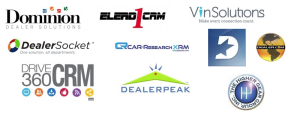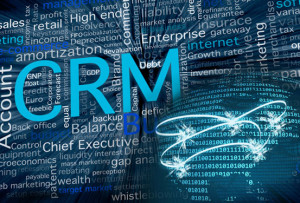There’s something wrong with your Dealership training process, not the CRM tool
 When your dealership first decides to use one particular CRM tool over all others, it’s because the Owner (and sometimes the GM) of the dealership sees a unique value in how that tool can help increase dealership sales and improve customer service. They made a commitment to ensure that all personnel in the dealership were trained to use the that tool to log and track all customer activity, and that all communication with prospects and clients should occur through this centralized (usually web-based) system. This, more often than not, is NOT happening in reality.
When your dealership first decides to use one particular CRM tool over all others, it’s because the Owner (and sometimes the GM) of the dealership sees a unique value in how that tool can help increase dealership sales and improve customer service. They made a commitment to ensure that all personnel in the dealership were trained to use the that tool to log and track all customer activity, and that all communication with prospects and clients should occur through this centralized (usually web-based) system. This, more often than not, is NOT happening in reality.
Effective use of CRM can help your dealership:
- close more deals,
- save deals,
- market more effectively,
- measure showroom activity in real-time, and
- improve customer satisfaction.
The last few months, I’ve noticed an alarming trend of dealers abandoning (or investigating abandoning) a CRM tool to which they were supposed to be committing. Sometimes this abandonment comes just a year after making a switch. The most common reason is that when there’s a change in dealership management, the new managers want to bring in a system that they’re used to and comfortable with, rather than making the commitment to learn how to maximize the system that’s already in place at their new place of employment. This commitment to the CRM has to come from ownership, and incoming managers need to adapt to the dealership CRM culture, not vice versa.
Another common reason I’ve heard for changing CRM tools is that an aggressive salesperson from a competing CRM company points out some new bell(s) or whistle(s) which the existing one does not have. Don’t get distracted by shiny objects! Keep your eye on your goal. Talk with your CRM company about it before you make a decision - sometimes the same new bell is right around the corner, and you won’t have to make the switch!
A large part of the success or failure in making the CRM tool work for the dealership is the level of accountability. First off, when used properly, a CRM is a money-making MACHINE. It takes a dedication, and seemingly tedious discipline to use one. But it’s also a PROFITABLE discipline. It enables you to see every interaction that the customer has ever had with your dealership! If knowledge is power - than this is a rocket-launching drone that has the precision to strike any target, any time.
 Top management MUST hold middle management and the staff accountable for recording activity. Once all of the activity IS being recorded, then it’s up to top management to take advantage of the extensive reporting to learn:
Top management MUST hold middle management and the staff accountable for recording activity. Once all of the activity IS being recorded, then it’s up to top management to take advantage of the extensive reporting to learn:
- Which ZIP codes are most successful for the dealership?
- Which advertising sources are driving the most showroom traffic?
- Which forms on my website aren’t driving enough leads to the CRM tool?
- A scientific guide to where to advertise and what type of budget to set based on results:
If the tool is being used effectively, there should be no reason to make the switch, unless your partnership with your existing CRM has broken down completely.
“Commitment to the CRM has to come from ownership, and incoming managers need to adapt to the dealership CRM culture, not vice versa.”
Do NOT make a switch simply because it can save the dealership $100, $200, or even $300 per month. What is the cost of the dislocation? I’m guessing that it’s probably more than $3,600/year. There will almost certainly be a functionality you will lose from one CRM to another.
Here’s what you risk losing by switching your Car Dealership CRM systems:
- All of the customer email interaction history - both received and sent. Lots will import the event as a record but not the emails themselves.
- Current Status of where the customer left off with your dealership last - often, statuses are handled differently from one system to another.
- The knowledge already acquired by your staff about using your current CRM system.
- Frustration by your long-time staff in having to learn a brand new system.
- Dislocation in your sales while your staff gets up to speed in the new system.
- There’s no guarantee that you will get the training and support needed by the CRM company to change such an integral part of your dealerships’ day-to-day operations.
- The possibility that certain customized pieces of information (like notes) may be lost in the data transfer.
- Some of the functionality used in unique ways by the dealership staff.
Changing CRM tools should be an absolute LAST RESORT and is admitting a failure to train your employees to follow a certain protocol. If an effective CRM tool is being properly used by a dealership, then it’s much more difficult abandon the investment they’ve already made in training and accountability.
Unless your dealership’s CRM tool is HINDERING your ability to communicate effectively with customers, you really should NOT be considering a switch. Do not switch simply because you’re bored with the current system, or because you were sold on some shiny new piece that may or may not work how you think it will when put into action. Think of the evil you know versus the evil that you don’t…
Do your homework and talk to some happy AND unhappy customers. Reach out to the automotive online community on DrivingSales.com, DealerRefresh’s Forum, dealerElite, ADMCommunity, and more. There are great, helpful people who participate on those sites regularly, both in article and forum content, who have the answers to your questions – just reach out and ask.DrivingSales.com, specifically, has a Vendor Ratings section with over 17,000 ratings.
Here’s a link to DrivingSales’ CRM ratings.


